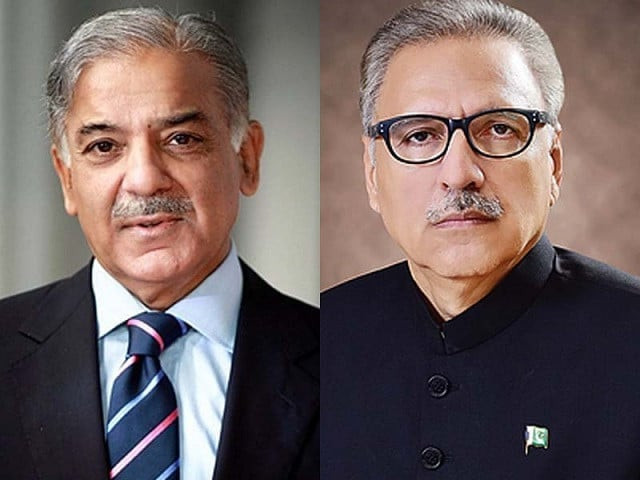President returns bill limiting CJ's powers to parliament
Alvi says can be assailed as a ‘colourable legislation’

President Dr Arif Alvi on Saturday returned the Supreme Court (Practice and Procedure) Bill, 2023 – which aims to curtail the powers of the chief justice of Pakistan to take suo motu notice and constitute benches on his own – to the Parliament for reconsideration.
The federal cabinet had requested
that the president immediately sign the bill, in an effort to resolve the country's constitutional and political crisis.
The bill, which has already been approved by the National Assembly and Senate, was passed in the aftermath of the Supreme Court’s decision to order elections in Punjab and Khyber-Pakhtunkhwa within 90 days of their dissolution, among other such decisions.
According to a statement issued from the president’s secretariat, President Alvi returned the bill “as per the provisions of Article 75 of the Constitution”, adding that “the bill prima facie travels beyond the competence of parliament and can be assailed as a colourable legislation”.
However, Prime Minister Shehbaz Sharif said the return of Supreme Court bill duly passed by the Parliament was most unfortunate.
Read Govt to not accept ‘hasty’ SC verdict
In a tweet on social media platform Twitter, he said, “President Alvi returning the Supreme Court Bill duly passed by Parliament is most unfortunate. Through his conduct, he has belittled the august Office by acting as a worker of the PTI, one who is beholden to Imran Niazi more than the Constitution & demands of his Office.”
“The president said that he thought it fit and proper to return the bill, in accordance with the Constitution, with the request for reconsideration in order to meet the scrutiny about its validity (if assailed in the Court of Law)”.
The president, after “an in-depth consideration” of the bill, listed aspects that required consideration “to provide for the practice and procedure of the Supreme Court of Pakistan”.
He stated that “Article 191 of the Constitution empowers the Supreme Court ‘to make rules regulating the practice and procedure of the court’”, and that “under such enabling provisions of the Constitution, the Supreme Court Rules 1980 have been made and in force duly validated and adopted by the Constitution itself”.
He continued that “these time-tested Rules were being followed ever since the year 1980 – any tinkering with the same may tantamount to interference with the internal working of the Court, its autonomy and independence”.
The president’s second reasoning was that the Constitution was “founded on the concept of trichotomy of power – three pillars of the State whose domain of power, authority and functions are defined and delineated by the Constitution itself”.
“Parliament has also been given the power under Article 67 that states “subject to the Constitution, a House may make rules for regulating its procedure and the conduct of its business….”. Article 191 states that “subject to the Constitution and law, the Supreme Court may make rules regulating the practice and procedure of the Court”.”
He highlighted that Articles 67 and 191 were akin to each other and recognize the autonomy and independence of each other respectively – barring interference of one into the other’s domain.
Alvi furthered that the SC was “an independent institution as visualized by the founding fathers that in the State of Pakistan ‘independence of judiciary shall be fully secured’'.
He continued that with such an objective in view, “Article 191 was incorporated and the Supreme Court was kept out of the law-making authority of the Parliament”.
According to the president, “the competence of parliament to make laws stems from the Constitution itself. Article 70 relates to ‘introduction and passing of Bills’ with respect to any matter in the Federal Legislative List – enumerated in the Fourth Schedule of the Constitution”.
“Followed and further affirmed are the provisions of Article 142(a) that Parliament can make laws ‘with respect to any matter in the Federal Legislative List’. Entry 55 of Part I of the Fourth Schedule while empowering the Parliament to make laws in respect of ‘jurisdiction and powers of all courts except the Supreme Court’ especially excluded the Supreme Court.”
He emphasised that the bill, “prima-facie travels beyond the competence of the Parliament and can be assailed as a colourable legislation”.
The president maintained that “the idea may be laudable” but questioned if “such a purpose” could be achieved “without amending the provisions of relevant Articles of the Constitution”.
He added that the established law is that the provisions of the Constitution “cannot be amended by an ordinary law as the Constitution is a higher law – father of laws – a Constitution is not an ordinary law, but rather an embodiment of fundamental principles, higher law, and law above other laws”.



















COMMENTS
Comments are moderated and generally will be posted if they are on-topic and not abusive.
For more information, please see our Comments FAQ